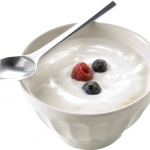What is Yoghurt?
Posted on | May 11, 2012 | No Comments
Yoghurt is produced by fermenting milk with bacteria called “yoghurt cultures”. Fermentation of lactose (sugar) by this bacteria produces lactic acid, which causes the protein in milk to thicken and become tangy / sour.
Yoghurt is rich in protein, calcium, riboflavin, vitamin B6 & B12. The live bacteria that is retained is extremely beneficially for gastrointestinal health.
Because yoghurt is sour, not too many people enjoy the natural flavour. Therefore, yoghurt is typically mixed with fruit or sweetened with sugar, colours and syrups before being sold.
Nutrition information of Yoghurt: Average all brands 200g
|
|
Plain (natural) |
Plain (Low fat / Skim) |
Fruit Flavoured |
Fruit Flavoured (diet) |
Greek Style |
|
Energy |
145 cals |
105 cals |
200 cals |
90 cals |
290 cals |
|
Protein |
8 g |
7 g |
7 g |
9 g |
8 g |
|
Carbs |
15 g |
12 g |
17 g |
18 g |
29 g |
|
Fat |
7 g |
1 g |
5 g |
0 g |
20 g |
It’s always best to eat plain natural yoghurt to get the ultimate health benefits. If you choose a ‘low-fat’ or diet option, generally an artificial sweetener has been used so that the yoghurt tastes sweet but has lower calories. My last tip is – read the labels carefully, always check the number of portions per container. Yoghurt is notoriously bad at making their food labels look better by quoting a smaller portion size!
Enjoy!
Cool Fact: Lactose-intolerant people can consume yoghurt because the lactose has been converted and partially fermented!
Note: This type of healthy yoghurt IS NOT the same as frozen yoghurt. Frozen yoghurt has is more like dessert / ice-cream, has a higher sugar content and not as many health benefits.
Related posts:
Calories in Marigold Non-Fat Yoghurt ...
Yoghurt has entered the retail snack food mark...
What is Frozen yoghurt: Frozen yoghurt is con...
Tags: calories in marigold yoghurt > calories in non fat yoghurt > calories in yami yoghurt > calories in yoghurt > what is yoghurt
Comments
Leave a Reply
You must be logged in to post a comment.




